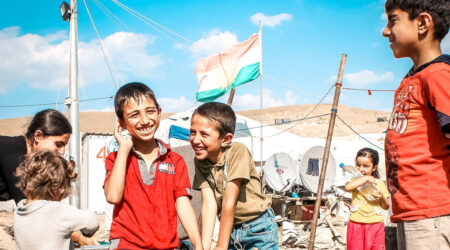t-CETA Study

The study aims to adapt and evaluate the Common Elements Treatment Approach (CETA) for delivery by trained lay counsellors over the phone to Syrian refugee children living in Lebanon.
Empirical studies investigating the mental health of children in humanitarian settings have found that many children in war-affected settings with a need for psychological treatment don’t have access to mental health services.
Humanitarian health organisations working in these settings tend to be confronted with many obstacles, including lack of funding to set up new mental health services, difficulties in recruiting qualified local staff, and restricted access of the refugee population to primary health care centres.
These challenges are difficult to address with conventional mental health services, which tend to be provided by mental health specialists in centralised primary health care centres. To overcome these hurdles, this study aims to adapt and evaluate the existing transdiagnostic psychological treatment programme called Common Elements Treatment Approach (CETA) for the delivery by trained lay counsellors over phone. The study has been funded by a grant awarded by Elrha.
The project has two objectives:
- Development of telephone-delivered CETA (t-CETA) by adapting the existing face-to-face CETA intervention
- Evaluation of the feasibility of t-CETA with a small mixed-methods pilot trial
If found to be effective, telephone-delivered CETA (t-CETA) will facilitate the provision of psychological intervention for children in humanitarian emergency and other low-resource settings with limited access to mental health services.
For a short summary of preliminary study results, see here t-CETA Preliminary study results [PDF 627KB]
Team and Collaborators:
- Queen Mary University of London (PI: Prof Michael Pluess; Dr Fiona McEwen)
- Médecins du Monde (MdM; Nicolas Chehade, Patricia Moghames)
- Johns Hopkins University (Dr Laura Murray, Stephanie Skavenski, Dr Paul Bolton)
- Medical School Hamburg (Prof Roland Weierstall)
- American University of Beirut (Dr Tania Bosqui)
Funding
- The t-CETA research project is funded by Elrha’s Research for Health in Humanitarian Crises (R2HC) Programme, which aims to improve health outcomes by strengthening the evidence base for public health interventions in humanitarian crises. R2HC is funded by the UK Foreign, Commonwealth and Development Office (FCDO), Wellcome, and the UK National Institute for Health Research (NIHR). Visit Elrha’s website for more information about their work to improve humanitarian outcomes through research, innovation, and partnership.
Webinar
Telephone-Delivered Psychological Treatment for Children in Humanitarian Settings: Results of the t-CETA Study
In this webinar, broadcast on February 24 2021, we introduced the key elements of t-CETA and shared our first-hand experience of delivering it in Lebanon.
We presented qualitative and quantitative research findings on the feasibility, acceptability and efficacy of the programme, and shared free resources that were developed as part of the project.
Go to the webinar blog post to find out more.
t-CETA Team
The t-CETA study was set up by PI Prof Michael Pluess and coordinated by Dr Fiona McEwen.
- Michael Pluess (University of Surrey, UK; QMUL, UK)
- Fiona McEwen (QMUL/KCL)
Research Team (in alphabetical order)
- Paul Bolton (JHU)
- Tania Bosqui (AUB/TCD)
- Nicolas Chehade (Research Manager for t-CETA study)
- Kristin Hadfield (TDC/QMUL)
- Elie Karam (IDRAAC, Lebanon)
- Laura Murray (JHU)
- Stephanie Skavenski (JHU)
- Roland Weierstall (JHU)
Clinical Team (Lebanon)
- Gisèle Asmar – psychotherapist
- Vanessa Kyrillos – clinical psychologist
- Diana Abdul Rahman – counsellor / case manager
- Stephanie Saad – counsellor / case manager
- Elyze Nassr – case manager
The research was only possible with the support of a large number of students, research assistants, volunteers, and support staff in the UK and Lebanon.
t-CETA Team in Lebanon
- Dana Berry
- Hania El Khatib
- Fatima Farhat
- Zeena Hashem
- Salam Jabbour
- Tamara Maalouf
- Anas Mayya
- Melissa Nawful
- Noura Sahili
KEY
AUB: American University of Beirut, Lebanon
BU: Faculty of Medicine, Balamand University, Lebanon
IDRAAC: Institute of Research, Advocacy, and Applied Care, Lebanon
JHU: Johns Hopkins University, US
KCL: King’s College London, UK
MSH: Medical School Hamburg, Germany
QMUL: Queen Mary University of London, UK
SGHUMC: Saint George Hospital University Medical Center, Lebanon
TCD: Trinity College Dublin, The University of Dublin, Ireland
